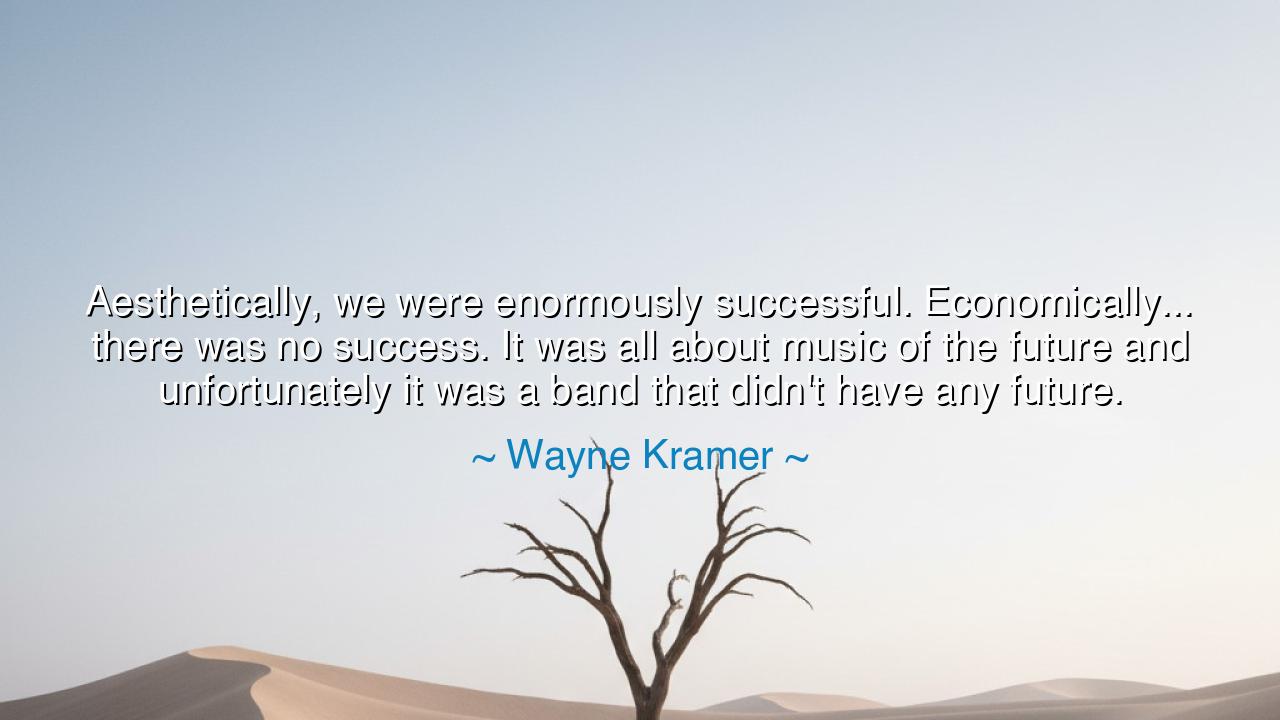
Aesthetically, we were enormously successful. Economically...
Aesthetically, we were enormously successful. Economically... there was no success. It was all about music of the future and unfortunately it was a band that didn't have any future.






"Aesthetically, we were enormously successful. Economically... there was no success. It was all about music of the future and unfortunately it was a band that didn't have any future." These words by Wayne Kramer speak to the tragic tension between artistic vision and practicality, between the dreams of the future and the harsh realities of the present. The band he speaks of—a group that was deeply connected to the creative and cultural movements of its time—was able to push the boundaries of music, to create something revolutionary and aesthetically remarkable. Yet, as Kramer reflects, the lack of economic success illustrates a profound reality: while artistic achievement can stand as a symbol of cultural significance, without the support of sustainability or practicality, even the most visionary of endeavors may ultimately struggle to thrive in the long term.
This tension between art and economy has been at the heart of many ancient stories, where passion and purpose often collided with the needs of survival and pragmatic concerns. In the Greek myth of Icarus, the young Icarus, filled with youthful ambition and an urge to soar beyond the confines of the world, flew too close to the sun, ignoring the wisdom of his father Daedalus. His aesthetic desire to reach the heavens led to his destruction. In this myth, we see a clear parallel: while Icarus's pursuit of greatness and artistic expression was indeed bold and powerful, his inability to balance vision with prudence led to his downfall. Similarly, Kramer reflects on a time when artistic ambition was not matched by the practical, economic support necessary to make such creativity sustainable.
The truth of Kramer’s reflection is not a new one. Across history, the most brilliant artists, musicians, and visionaries have often found themselves caught between their desire to create something new, radical, and transformational, and the harsh need for economic success in the world. Take Vincent van Gogh, for example. Though he is now considered one of the greatest painters of all time, his economic success during his life was almost nonexistent. He lived in poverty, supported mainly by his brother Theo, and struggled with the tension between his artistic integrity and the need to make a living. Van Gogh’s story highlights the painful reality that art and commerce do not always walk hand in hand, and true genius is not always rewarded in the world as it is.
The lesson of Kramer’s quote is twofold: first, it serves as a reminder of the importance of sustainability in our pursuits. Artistic ambition, while vital and crucial for cultural evolution, must find ways to thrive in the real world, which often demands practical resources and support. Yet, at the same time, it is a reminder that success should not always be measured by economic standards alone. What is aesthetic or cultural success may, in fact, have a lasting impact, even if the financial rewards do not come. History is filled with examples of visionary work—like the plays of Shakespeare or the sculptures of Michelangelo—that were not financially profitable in their time but have since shaped culture for centuries.
In our own lives, this tension remains ever present. We may have dreams, visions, and passions that call us to create or innovate, yet the world often asks us to measure success through economic gain. What Kramer suggests is that balance is necessary: we must remain true to our vision, while also acknowledging the practicalities of life. If we create for the sake of creating, and if our passion drives us to make something of lasting value, we must also seek ways to sustain that vision—whether through financial support, partnerships, or other means. To be sustained, however, we must be careful not to compromise on the essence of what we are trying to express, as Kramer suggests was the downfall of the band he describes.
The lesson we must take from Wayne Kramer’s reflection is to remain faithful to our vision while also acknowledging the realities of the world in which we live. In our pursuits—whether in art, business, or personal growth—we must be prepared to engage both with the ideal and the practical, balancing our lofty dreams with the need for resources, support, and strategy. The world may not always reward creativity in the ways we expect, but that does not mean our work lacks value. If we are to build something lasting, we must look for ways to merge the ideal with the possible, the aesthetic with the practical.
In the end, the true measure of success is not just in financial gain or in immediate recognition. Rather, it lies in the ability to create with purpose, to leave behind something meaningful, and to ensure that the work we do continues to resonate long after its creation. Whether or not the world sees the economic success of a movement, art and innovation have the power to transcend the fleeting nature of material wealth, leaving behind a legacy that impacts future generations.






AAdministratorAdministrator
Welcome, honored guests. Please leave a comment, we will respond soon